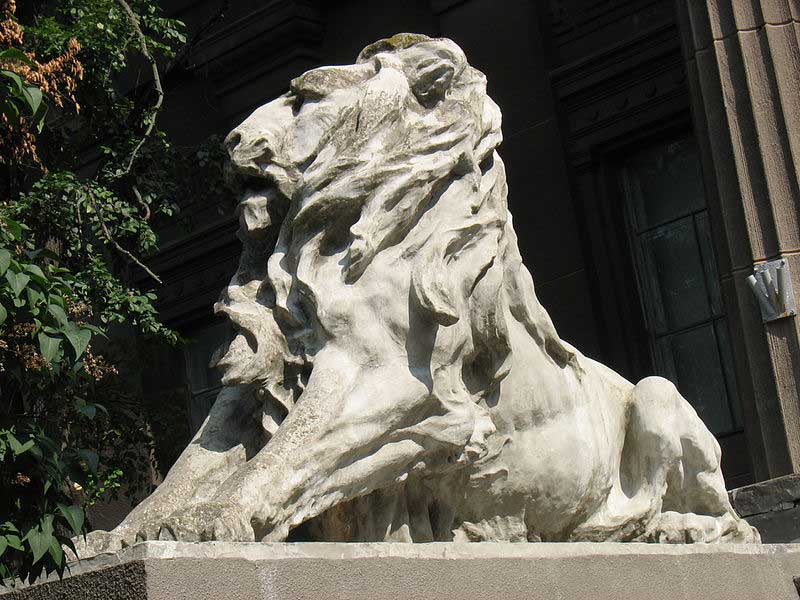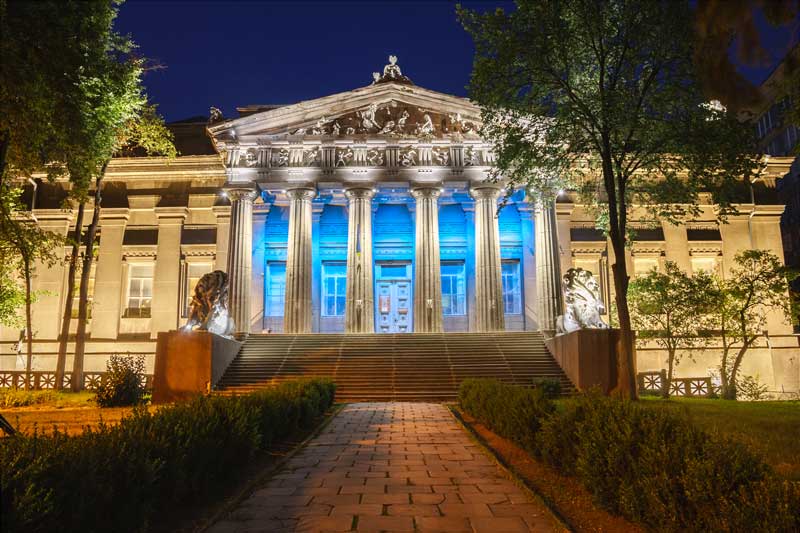
With the aim to put together a valuable collection of several representative pieces of Ukrainian fine art, the Ukrainian intellectuals founded the National Art Museum of Ukraine as the first free-for-all Kyiv museum, at the end of the 19th century. However, its first exhibition was arranged on the occasion of the ХІ All-Russian Archaeology Conference in August 1899 in the incomplete building of the City Museum of Antiquity and Art.
Nevertheless, the official opening and consecration of the museum took place in 1904, when it was named The Emperor Nikolai Alexandrovich Kyiv Art, Industrial and Scientific Museum. But before it came to be known as the artistic heritage of the Ukrainian people and became the leading museum of the country, the museum has repeatedly changed its name, along with the change of the profile of its collection. After it was nationalized in 1919, the museum was renamed the 1st State Museum, which was changed to the Taras Shevchenko All-Ukrainian Historical Museum in 1924 and the State Museum of Ukrainian Art in 1939. After that, it came to be known as the State Museum of Eastern European Art in 1942, when it merged with the Russian art collection under the common name the State Museum of East European Art, in 1944. Finally, it was granted a national museum status and earned its present name in 1994, after the proclamation of Ukraine’s independence.

The building of the museum, itself a monument of art, was constructed in the neoclassical style for the Kyiv City Museum, a museum for the local society of patrons of arts and antique lovers, in 1896 by a Polish architect Władysław Horodecki. However, it was based on the project of the talented Moscow architect Petro Boitsov, who, unfortunately, failed to get a government license. However, the sculptural decorations of the façade, created in the studio of an Italian sculptor, Elio Salia, also clearly reflect a neoclassical architectural form, with the precise reproduction of a six-column porch of the Doric order, along with the entablature, triglyphs, metopes and frieze decoration depicting the Triumph of Arts. The huge concrete lions, placed at the top of the stairs of the building, earned the museum a nickname, the Museum of Lions.
The building was constructed for 249,000 rubles, out of which the government of the Russian Empire paid only 100,000 rubles, while another 108,000 rubles were paid by the renowned Tereshchenko family, who also donated several items to the museum from the family collection. Just before Christmas, the museum was officially opened on 23 December 1904, as The Emperor Nikolai Alexandrovich Kyiv Art, Industrial and Scientific Museum, with Mykola Biliashivsky as the first director.

Housing around 40 thousand exhibits, the National Art Museum of Ukraine is broadly divided into three sections: old Ukrainian art, 19th and early 20th-century Ukrainian art and the Ukrainian art of the 20th century. It houses the most representative collection of Ukrainian figurative art, created in Ukraine and elsewhere, which includes the masterpieces of Ukrainian painting, sculpture and graphics from the Kyiv Russian age to the modern age. It also showcases the history of Ukrainian art and exhibits how art reflects the specific development of Ukrainian identity.
Its narrative of Ukrainian art starts with a collection of religious pieces, from icons to statues that have been taken from different churches in different periods. The directors of the museum took the initiative to bring Ukrainian artefacts from Moscow and St. Petersburg, as well as from Ukrainian artists living abroad in Europe and America, although it was stopped during the repressive rule of Joseph Stalin and a large part of the collection was dispersed and hidden.

The museum houses the invaluable polychrome wooden relief called Saint George with the hagiography of Byzantine origin, a rare object of the 12th century and one of the best of the Ukrainian icon collections. Middle Ages are represented with the classic examples of icon painting of the 14th to 16th centuries, originating from Western Ukraine, which includes the antiques, like Holy Mother Hodegetria, an iconographic depiction of the Theotokos or Virgin Mary, holding the Child Jesus from Volyn, St George the Dragon Slayer and The Passion of the Christ from the Halychyna region.

The amazing collection of Ukrainian baroque art in the museum evidences the excellent artistry of the masters of the Ukrainian baroque era. The collection includes the portrait of Bohdana Khmelnytskogo, a Ukrainian military commander, created in the Kyiv region in the first half of the 18th century and the iconic pairs of Martyrs Anastasia-Juliania and Barbara and Catherine, created in the 18th century in Northern Left Bank. Apart from that, icons from Kyiv-Pechersk Lavra, also known as the Kyiv Monastery of the caves, from the iconostasis, the symbolic link between heaven or the Holi of Holies and the nave, of Dormition Cathedral Entrance to Jerusalem and The Nativity, created in 1729 and the iconostasis from Berezna village in the Chernihiv Region, created during the 1860s, are the zest of the collection. The impression of this wonderful age is further strengthened by the collection of Ukrainian portraits of the 18th century, representing the first secular genre in Ukrainian painting.

During the 19th century, when St. Petersburg Academy of Arts was the trendsetter, the department of modern age art was opened in the National Art Museum of Ukraine, with the works of the famous Ukrainian portraitists, like Dmytro Levytskiy and Volodymyr Borovykovskiy, who connected their lives with the capital city of the Russian Empire. A small collection of paintings and graphic works by Shevchenko reflects a vision of his outstanding talent and evidences new democratic tendencies in Ukrainian figurative art, which was continued by the artists of the next generation. However, perhaps the heritage of Ukrainian is vividly represented in the museum by the fascinating works of the famous sculptor Oleksandr Arkhypenko and painters like Oleksa Hryshchenko, Oleksandra Ekster, Oleksandr Bohomazov, and Viktor Palmov.

The National Art Museum of Ukraine is neither the oldest nor the largest in the list of most famous museums in the world, but its prestige is constantly becoming higher Even today, it continues to expand its collection and collects unofficial artworks of the totalitarian period, the Ukrainian Underground period, during the Soviet rule in the country from the end of 1950 until 1991.